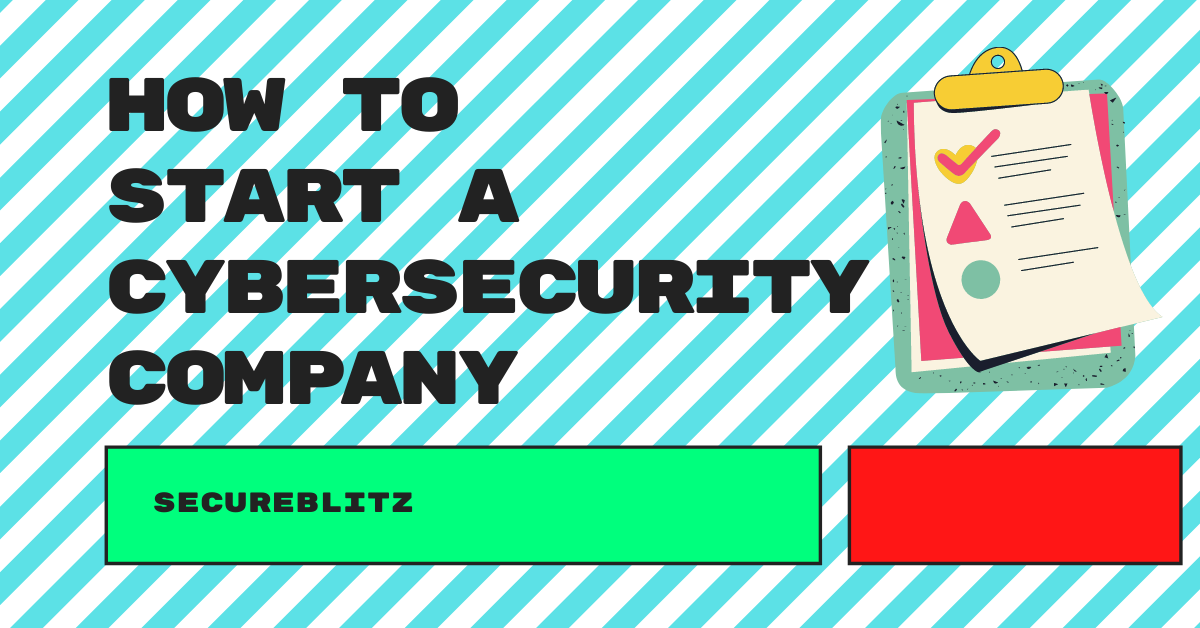This post will show you how to start a cybersecurity company.
Unsurprisingly, cybercrimes are on the rise in an increasingly digital world. The financial toll on businesses is also very high. A 2019 IBM report shows that data breach costs $3.92 million on average. These high financial stakes are asking for a high demand for cybersecurity services.
Large companies have the resources and budget to hire cybersecurity staff. However, small and medium-sized businesses usually can’t afford full-time cybersecurity employees. This is where cybersecurity expertise can turn into a successful security solutions business.
You can protect other companies from cyber risks like data breaches, cyberattacks, malware, phishing scams, and other digital threats by launching a company specializing in cybersecurity. No doubt, there are many cybersecurity threats to business.
If you’re considering starting a cybersecurity firm, you can apply your skills and enter this profitable market. You should follow these steps to lay the foundation for a successful business.
READ ALSO: How To Become An EC-Council Certified Ethical Hacker
Table of Contents
How To Start A Cybersecurity Company
1. The Right Professional Certifications
A master’s/bachelor’s degree in information technology, computer science, or a similar field is a good sign that you have the skills to start a cybersecurity or IT-related business. Certifications offer another way to build your credibility and signal your skills are practical and relevant.
Following are some of the most prevalent cybersecurity certifications available:
- Certified Ethical Hacker Certification:
- GIAC Security Essentials Certification (GSEC):
- Certified Information Systems Security Professional (CISSP):
- Certified Cloud Security Professional (CCSP):
- CompTIA Cybersecurity Analyst (CompTIA CySA+):
- ISACA’s Certified in the Governance of Enterprise IT (CGEIT):
- ISACA’s Certified Information Security Manager (CISM):
While skills and certifications are crucial, they are just one element of a successful strategy for launching a cybersecurity business. You must also create and execute a business plan.
2. Develop a Business Plan for your Cybersecurity Company
A business plan provides an essential pathway for your business. It must have the following in detail:
- Detailed company description
- Competitive market analysis to define your target market and identify your competitors, which may be dedicated cybersecurity consultants or providers of general IT services
- Legal framework for your business
- Products or services you plan to offer
- Marketing and sales strategy
- Funding/budget plan
- Financial projections of when your company will reach profitability.
READ ALSO: 8 Popular Types Of Cybercrimes In The 21st Century
3. Find the Right Location
Luckily, companies across the whole country need cybersecurity services. Beyond your ideal location, you should also consider your start-up capital and the nature of your business when deciding where to set up a shop. Your options include:
- Working from Home
Small business owners who go this way have many benefits. Travelling long distances is not involved or a distraction from a typical workplace, plus you get an improved work-life balance. But at times, one may feel lonely, requiring self-discipline to stay on task.
- Co-working Spaces
This option offers flexibility, plenty of benefits and advantages, and the company culture you don’t have when working from home. However, the set hours, lack of privacy, and limited space to grow might not fit your plans.
- Leasing or Buying Office Space
Having a commercial office space offers tax benefits and fixed costs. This option also won’t provide the same flexibility as a home office or a co-working space. If you rent or lease a space, you must also purchase commercial property insurance. This policy is typically required in the rental agreement and will protect your business’s building, furniture, supplies, and equipment.
4. Market your Services
Customers are the one thing your business can’t survive without. And marketing is the tool that delivers them. If you don’t plan to do the marketing yourself, consider hiring or outsourcing marketing to experts in the field.
You’ll need their expertise to help you launch your product, brand, and services. Before you venture too far with marketing, start with the basics. For a cybersecurity company, a well-designed website is the first place to begin.
5. Carefully Draft Client Contracts
Before any new project, be sure to sign a client service agreement. This contract should clearly define expectations for you and your client. One failed project without legal protection can derail your future in the industry, even if it’s not your fault. Make sure to seek help from a professional.
How To Start A Cybersecurity Company: Frequently Asked Questions
How do I create a cybersecurity consultancy?
Building a successful cybersecurity company requires a multi-pronged approach:
- Identify Your Niche: The cybersecurity landscape is broad. Focusing on a specific area like network security, cloud security, or incident response can help you cater to a defined client base.
- Assemble Your A-Team: Cybersecurity expertise is crucial. Recruit skilled professionals with certifications and experience relevant to your chosen niche.
- Develop Your Service Portfolio: Clearly define the cybersecurity services you offer, such as penetration testing, vulnerability assessments, or security awareness training.
- Craft a Winning Business Plan: Outline your company’s goals, target market, marketing strategy, and financial projections.
How much does it cost to start a cybersecurity company?
Costs can vary depending on factors like your location, team size, and service offerings. Startup costs can include:
- Business Registration and Licenses: Fees associated with registering your business and obtaining any necessary licenses.
- Equipment and Software: Investing in computers, security tools, and software licenses for your team.
- Marketing and Sales: Budget for building a website, marketing materials, and potential advertising expenses.
How do I find cybersecurity clients?
- Network Within the Industry: Attend industry events, connect with cybersecurity professionals on LinkedIn, and build relationships.
- Develop a Strong Online Presence: Create a professional website showcasing your services, expertise, and client testimonials.
- Consider Content Marketing: Publish informative blog posts or articles on cybersecurity trends to establish yourself as a thought leader.
Can anyone start a cybersecurity company?
While passion is important, a strong foundation in cybersecurity is essential. Consider acquiring relevant certifications like CISSP (Certified Information Systems Security Professional) or pursuing a degree in cybersecurity or computer science.
How do cybersecurity companies operate?
Cybersecurity companies typically operate by offering their services to businesses on a contractual basis. They conduct security assessments, provide ongoing monitoring, and help clients implement security measures to protect their systems and data. Some companies may also develop and sell cybersecurity software or training programs.
READ ALSO: How To Get A Cybersecurity Job With No Experience
Is it hard to start a cybersecurity company?
The cybersecurity industry demands expertise. While the barrier to entry can be high, a successful launch is achievable with careful planning and the right team.
What do cybersecurity firms do?
Cybersecurity firms offer various services to help businesses and individuals protect themselves from cyber threats. These can include:
- Security Audits and Assessments: Identifying vulnerabilities in a client’s systems.
- Penetration Testing: Simulating cyberattacks to test a client’s defences.
- Security Incident and Event Management (SIEM): Monitoring systems for suspicious activity and responding to security breaches.
- Security Consulting: Providing expert advice on cybersecurity best practices.
- Managed Security Services: Proactively monitoring and managing a client’s security infrastructure.
How to build a cybersecurity company from scratch?
Here’s a roadmap to get you started:
- Identify Your Niche: The cybersecurity landscape is vast. Focus on a specific area of expertise, such as cloud security, mobile security, or incident response.
- Assemble Your Team: Recruit cybersecurity professionals with the skills and experience to address your chosen niche.
- Develop Your Service Portfolio: Clearly define your services and how they address client needs.
- Create a Business Plan: Outline your financial projections, marketing strategy, and competitive analysis.
- Secure Funding: Consider bootstrapping, seeking investors, or applying for small business loans.
- Establish Legal and Regulatory Compliance: Ensure your company adheres to relevant data privacy and security regulations.
What is the structure of a cybersecurity company?
The structure will depend on your company’s size and service offerings. Here’s a general framework:
- Leadership: CEO, CTO (Chief Technology Officer) with cybersecurity expertise.
- Technical Team: Security analysts, penetration testers, incident responders.
- Sales and Marketing: The team generates leads and acquires clients.
- Customer Support: Providing ongoing technical assistance to clients.
Is a cybersecurity business profitable?
Yes, cybersecurity is a rapidly growing industry with a high demand for skilled professionals and services. A cybersecurity company can achieve significant profitability with a strong value proposition, effective marketing, and a focus on client satisfaction.
Conclusion
Now, you should be able to start a cybersecurity company.
Building a successful cybersecurity company takes time, dedication, and continuous learning.
By focusing on a niche, building a skilled team, and effectively marketing your services, you can become a trusted defender in the digital world.
SUGGESTED READS
- Cryptojacking Post Office exposed in Russia
- How to Become an EC-Council Certified Ethical Hacker
- 3 Critical Cybersecurity Questions To Ask Before Buying a Marketing SAAS Product
- 5 Certified Benefits of Identity Theft Protection
- Over 26 Million Stolen Credit Cards rescued from Hackers by Vigilantes
- 5 Tips For Digital Marketers To Avoid And Prevent Data Breaches
- Cyber Threats: How to Secure your Computer against Cyber Threats
- 5 Tips To Help You Successfully Translate Your Online Store
About the Author:
Marie Beaujolie is a computer network engineer and content writer from Paris. She is passionate about technology and exploring new ways to make people’s lives easier. Marie has been working in the IT industry for many years and has a wealth of knowledge about computer security and best practices. She is a regular contributor for SecureBlitz.com, where she writes about the latest trends and news in the cyber security industry. Marie is committed to helping people stay safe online and encouraging them to take the necessary steps to protect their data.
Daniel Segun is the Founder and CEO of SecureBlitz Cybersecurity Media, with a background in Computer Science and Digital Marketing. When not writing, he's probably busy designing graphics or developing websites.







